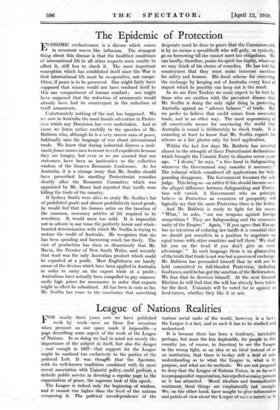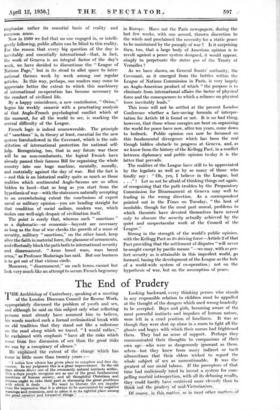League of Nations Realities , OR nearly three years " now
we hive published Fweek by week—save on those few occasions when pressure on our space - made it impossible—a page describing some aspect of the work of the League of Nations. In so doing *.e had in mind not merely the importance of the -subject in' itself, but also the danger —real enough in 1927—that support for the League might be confined too exclusively to the parties of the political Left. It was thought that the Spectator, with its well-known traditions combined with its more recent association istth Unionist policy, could perform a definite public service in devoting a regular page to the organization of peace, the supreme task of this epoch.
The League is indeed only the beginning of wisdom, and it cannot rise higher than the level of the nations composing it. The political interdependenee Of the various social units of the world, hoivever, is a fact: the League is a fact, and as such it has to be studied and understood. .
It is because there has been a tendency, inevitable perhaps, but none the less deplorable, for people in this country (as, of course, in America) to .see the League in the wrong light, as an idea or an ideal instead of as an institution, that there is to-day still a deal of mis- understanding as to what the League is, what is its purpose, and what are its methods. We are not prepared to deny that the League of Nations Union, in so far as it is a propagandist organization, has repelled as many persons 'as it has attracted.- Moral idealism -and humanitarian sentiment, these things are emphatically not enough. We,- on the other hand, have sought to give information and points of view about the League of suela a nature as to emphasize rather its essential basis of reality and common sense.
Now in 1930 we feel that no one engaged in, or intelli- gently-following, public affairs can be blind to this reality. For the reason that every big question of the day is inevitably and essentially international—that, in fact, the work of Geneva is an integral factor of the day's work, we have decided to discontinue the " League of Nations Page," but in its stead to allot space to inter- national themes week by week among our regular articles. In this way, perhaps, our readers may come to appreciate better the extent to which this machinery of international co-operation has become necessary to the conduct of civilized life.
By a happy coincidence, a new contributor, " Orion," begins his weekly causerie with a penetrating analysis of that Anglo-French psychological conflict which at the moment, for all the world to see, is marking the central difficulty of the League.
French logic is indeed unanswerable. The principle of " sanctions" is, in theory at least, essential for the new system foreshadowed in the Covenant, which is the sub- stitution of international protection for national self- help. Recognizing, too, that in any future war there will be no non-combatants, the logical French have already passed their famous Bill for organizing the whole country into one huge machine, mentally, morally, and materially against the day of war. But the fact is —and this is an historical reality quite as much as those realities which sentimental Anglo-Saxons are so often bidden to heed—that so long as you start from the hypothesis of war—with the statesmen naturally accepting to an overwhelming extent the conclusions of expert naval or military opinion—you are heading straight for that condition of - social sadism, modern war, which makes one well-nigh despair of civilization itself.
The point is surely that, whereas such " sanctions " as a diplomatic—or economic—boycott are necessary so long as the fear of war checks .the growth of a sense of security, military " sanctions," on the other hand, keep alive the faith in material force, the glamour of armaments, and effectually block the path both to international security and disarmament. " Arms breed wars, wars breed arms," as Professor Madariaga has said. But our business is to get out of that vicious circle.
Moreover, " disarmament," on such terms, cannot but look very much like an attempt to secure French hegemony • in Europe. Have not the Paris newspapers, during the last . few weeks, with one accord, thrown discretion to the winds and proclaimed the necessity for a static peace to. be maintained by the panoply of war ? Is it surprising then, too, that a large body of American opinion is in revolt against .a peace system designed, it would appear, simply to 'perpetuate the status quo of the Treaty of Versailles ?
As we have shown, on General Smuts' authority, the Covenant, as it emerged from the battles within the League of Nations Commission in Paris, is very largely an. Anglo-American product of which the purpose is to eliminate from international affairs the factor of physical force and the consequences to which a reliance on physical force inevitably leads."
This issue will not be settled at the present London Conference whether a face-saving formula of interpre- tation for Article 16 is found or not. It is no bad thing, however, that those whose energies are -bent on organizing the world for peace have now, after_ ten years, come down to bedrock. Public opinion can now be focussed on this fundamental . divergence which has been the real though hidden obstacle to progress at Geneva, and, as we know from the history of-the Kellogg Pact, in a conflict between diplomacy and public opinion to-day it is the latter that prevails. • The realities of the League have still to be appreciated by the legalists as well as by so many of those who fondly say : " Oh, yes, I believe - in -the League, but . . ." I Let us not be afraid of thinking things out again, of recognizing that-the path trodden by the Preparatory Commission for Disarmament at Geneva may well be leading in the wrong direction. As a correspondent pointed out in the Times on Tuesday, " the host of insoluble, though for the most part unreal, problems to which theorists have devoted themselves have served only to obscure the security actually achieved by the quiet and unspectacular work of the Council of the • League."
Strong in the strength of the world's public opinion, with the Kellogg Pact as its driving force—Article 2 of that Pact providing that the settlement of disputes "will never besought except by pacific means "—we may, with as per- fect security as is attainable in this imperfect world, go forward; basing the development of the League as the hub of a world-wide system of co-operation ; not on the hypothesis of war, but on the assumption of peace.



























































 Previous page
Previous page